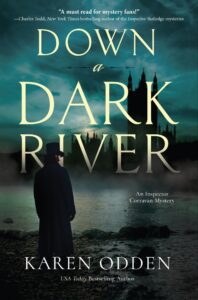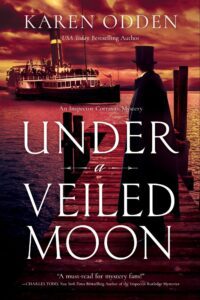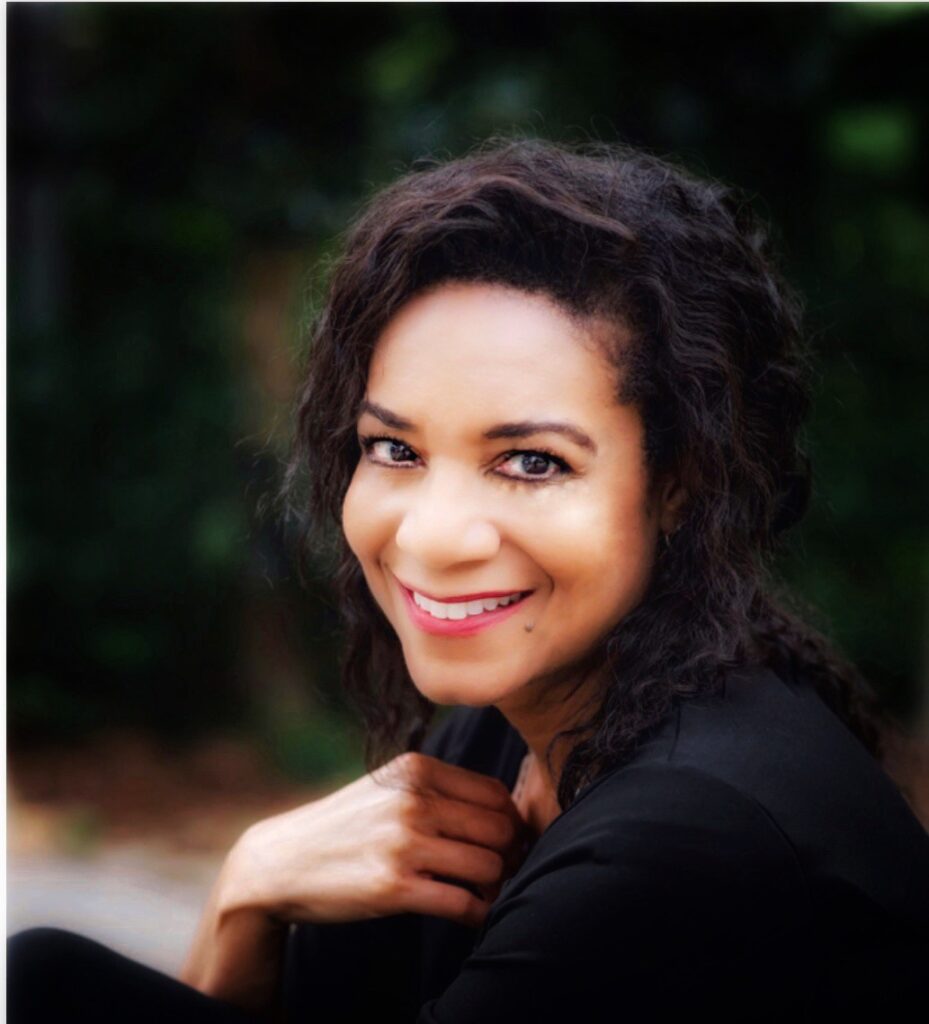 One of my favorite funny stories about writing comes from my friend Susan Elia MacNeal, who has published ten Maggie Hope mysteries set in WWII. In researching, Susan read Winston Churchill’s letters, where she found he used the abbreviation “OMG.” It’s not as surprising as it sounds; because telegrams were expensive and priced by the word, abbreviations became habitual in letters as well. But Susan obviously couldn’t put “OMG” into her book because even though it was historically true, it would diminish the verisimilitude. I could just imagine a laughing reviewer: “What’s next? Churchill writing TTYL? Seriously?”
One of my favorite funny stories about writing comes from my friend Susan Elia MacNeal, who has published ten Maggie Hope mysteries set in WWII. In researching, Susan read Winston Churchill’s letters, where she found he used the abbreviation “OMG.” It’s not as surprising as it sounds; because telegrams were expensive and priced by the word, abbreviations became habitual in letters as well. But Susan obviously couldn’t put “OMG” into her book because even though it was historically true, it would diminish the verisimilitude. I could just imagine a laughing reviewer: “What’s next? Churchill writing TTYL? Seriously?”
In this case truth and verisimilitude couldn’t be reconciled. On the one hand was some “common knowledge” about modern-day texting; on the other, some very “uncommon knowledge” about Churchill’s writing.
But what about less extreme instances?
As writers representing our fictional worlds (historical or not), sometimes we run up against readers’ assumptions or “common knowledge” about a period or place, which can range from slightly skewed to outright misinformation.

For example, after Down a Dark River was published, a reader complimented my detailed research, but said I had one important fact wrong: the Victorians drank tea, not coffee, as Corravan does. “There wasn’t a Starbucks on every corner like now,” she concluded, softening her criticism with, “LOL.”
I understand why this reader believes the Victorians only drank tea. Tea was a more common beverage
– although coffee had been a staple in the 18th century. Also, tea is ubiquitous in popular television and movies about England, from adaptations of Jane Austen’s novels to Ted Lasso. (Many readers lump Austen in with the Victorians, though she died twenty years before Victoria took the throne.) Tea also is a trope for the class-consciousness in Victorian England – with the aristocratic ladies sipping it, pinkies up, and the servants serving it.
However, the fact is that thousands of pounds of coffee were still making their way into London every year, and silversmiths were still crafting gorgeous coffee services in the 1870s.
This reader’s comment about the Victorians and tea gestured to a larger concern – namely, (when) should writers sacrifice or elide historical truth to keep the reader from tossing the book aside, saying, “Oh, that’s ridiculous”? Are there ways that I might cue a reader that what they believe about Victorian England might not be wholly accurate – without info-dumping and without “talking down” to the reader? I started keeping an eye out for how other authors do this, and I began incorporating techniques into my own books.

One easy possibility is to address the assumption directly. In the sequel,Under a Veiled Moon, I have Corravan mention that Harry Lish (who lives with him) likes tea, but Corravan can’t abide weak liquids in the morning. It cues the reader that I am aware that most people drink tea, and Corravan is just a bit contrary, in this, as he is in other things.
Another way is to have one character in the book stand in as the skeptic, holding a view that a reader might hold. This can result in two characters arguing (yay, conflict!), with one character finally proving that the counter-intuitive fact is correct. In Down a Dark River, Corravan and Dr. Everett argue about whether Madeline’s husband has the right to take her out of the hospital, against medical advice. Dr. Everett correctly insists that under the Victorian legal doctrine of coverture, the husband’s wishes always trump the doctor’s, even if the wife is profoundly ill – which surprised some readers.
I also use the Author’s Note at the end as my Get-Out-of-Jail-Free card for taking some liberties, such as moving a church from one part of London to another because I liked the church’s name and its true history of providing a home and services for reformed prostitutes.
One helpful practice is I ask beta-readers to put a “TV” in the margin when something might tug at the verisimilitude and feel unbelievable to a modern reader, or a reader who doesn’t know an unfamiliar setting.
The good news is that if the bulk of a book is demonstrably well-researched, creating a coherent and detailed world, it achieves the overall effect of verisimilitude, and writers can often get away with presenting a few unlikely facts. The important thing is to be mindful about the tension that produces and about when and why you’re going to insert it.
How do you handle this issue?
USA Today bestselling author Karen Odden received her PhD from NYU, taught at UW-Milwaukee, and edited for academic journals before writing fiction set in 1870s London. Her fifth novel, Under a Veiled Moon (2022), was nominated for the Agatha, Lefty, and Anthony Awards for Best Historical Mystery and features Michael Corravan, a former thief turned Scotland Yard Inspector. Karen serves on the national board of Sisters in Crime and divides her time between Arizona and Utah. Connect with her at www.karenodden.com







Karen,
Thanks for stopping by today with such an insightful post.
My pleasure! I’m curious to see how other writers handle this issue.
I enjoyed your post, Karen. Sherlock Holmes (alive during the Edwardian and Victorian periods) was a coffee drinker. I, too, use Author’s Notes to explain my twisting of the truth.
Thanks, Kathleen!! Yes – and so was Conan Doyle a coffee drinker, by some reports. 🙂
Good point about a simple thing… coffee vs. tea and the use of author’s notes to clarify things.
Excellent points and problem solving the issues.
Thanks, Joanne!
Interesting balance of truth and story telling in writing historical fiction or in your case plays and such?
OMG, Karen! You woke me up to an issue I’d FELT while writing and editing but not actually consciously reflected upon. Further, you made it fun. Love your books. Thanks for them all.
Pamela,
Glad you stopped by and let Karen know she’d hit on an issue that was important to you…even subconsciously!
Thanks, Pamela!! I, too, as you say, had FELT this issue for a while before I sat down to pay attention to it and really think about how to manage it in my fiction. I was so grateful when Debra invited me to write because my thoughts had been bubbling for a while … and writing (as usual) helped clarify some ideas about it. Oh — and thank you for loving my books. I’m grateful for all your support, in all kinds of ways! 🙂
Great post, Karen, and good tips on how to slide in explanations for those seeming anachronisms.
Edith,
Appreciate you leaving a comment today. I agree with you that Karen’s tips for sliding in explanations are on the money.
Thank you, Edith!! Coming from you, this is a huge compliment, for you manage historical details so well in your fiction!
Great insights on a tough issue, Karen.
One of my murder mysteries is set in 1949 Denver with a police officer as my main character. During writing, I brought in a chapter to a critique group and several people balked at a modest reference I made to what then was a crude computer system. They said I had it wrong. It couldn’t be possible. I was accurate. There was such a system. However, it wasn’t a point that was critical to the plot, and I thought of all those readers who would question the reference without my ability to explain that it was true. So I cut it.
Interesting. Hard to decide when to cut and when not to, but if it bothers readers that much and isn’t critical to the plot, cut. But I bet a lot of authors wouldn’t have wanted to give up their research.
Yes – sometimes that’s hard to let a true fact go. It’s all about weighing which battles you want to fight. (Sort of like me with my teenagers… !) I wonder if there’s some formula … like, if you present a certain percentage of historical fact/research that are within the realm of “common knowledge,” can you get away with 5% or 10% that aren’t commonly known? I wonder. I guess my question for you — If that computer system were essential to your plot, do you have a suggestion for how you might be able to made it seem credible? I’d love to hear. I am going to continue to explore this issue, I think. So many people have responded with their own struggles about it. Thanks so much for commenting! I look forward to reading your books.
Thanks for raising this issue for readers and authors. The drive for authenticity is by no means limited to historical fiction.
I totally agree with you. But, I think it becomes most notable in historical fiction.
Absolutely!! I mean, I only write historical fiction, so that’s my little frame of reference. But I think in some ways it’s even MORE of a dilemma in contemporary fiction — because readers think, Oh, I know this world, it’s the one I live in. So if you present some fact that seems outside their “common knowledge,” they won’t think, “Well, it’s Victorian England, and I don’t know much about it, so … maybe I’ll give the author a pass.” I imagine that can be really challenging. Thanks for your comment, Saralyn 🙂
Very interesting post about one more line writers should cross with caution. Thank you!
I don’t know about you, Gay, but it wasn’t something that jumped out at me until Karen brought the point home. Appreciate you stopping by today.
Thank you for commenting on my post! I appreciate you stopping by. I like the way you put that — one more line writers should cross with caution. Is it ok if I use it? 🙂 I’ll credit you.
Excellent and informative post, Karen. Anticipating the reader’s doubts by addressing them through a character’s dialogue is something that really resonates with me. It’s a great way to tackle misconceptions about a world many people think they know.
Lori, good point.
Thanks so much, Lori!! I appreciate you commenting … especially as you handle a world most of us don’t know (ballet) so beautifully.
Very interesting–thanks! I was researching fighting styles for a book set in Edwardian-era London. I found that not only was there a Japanese teacher of martial arts active in London at this time, but he accepted female students! Some readers were surprised at this in my book.
I can imagine that readers were surprised, but those are the little tidbits I love to read (and learn from). Thanks for your observation today.
Karen,
Excellent discussion.
I would add that this issue is not limited to historical fiction. This happens even today when you are writing about a group of people where others are not familiar with a particular culture. I was writing a story about an LDS family in Salt Lake and was told their response to a crisis was not believable. However, after living there for 10 years and knowing many members of the church I knew that their response to stress was typical.
This is one reason why we have sensitivity readers today.
Elizabeth
Elizabeth,
Thanks for your post. As many noted, the issue is not limited to historical fiction, but it is one all authors face.